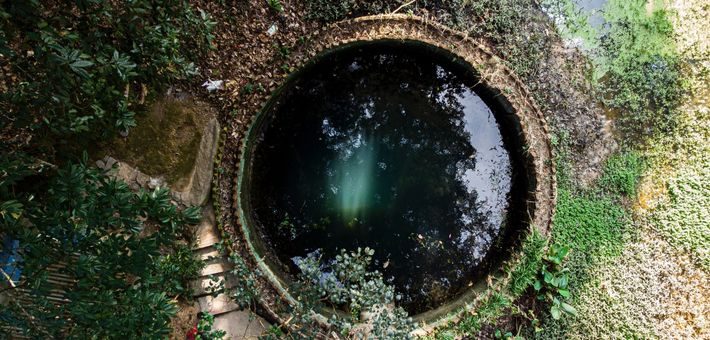Commentary on Exodus 17:1-7
“Is the Lord among us or not?” (Exodus 17:7).1 What proof and signs can persuade a thirsting, frightened people that God is with them and leads them in the wilderness?
If God is the God who saves, who gives and sustains life, then God in their midst and in their inmost parts must provide, at the very least, that which is necessary for survival.
One hundred hours. That’s the oft-cited statistic for how long a human body can typically survive at “average” temperatures without access to water. Today’s Sinai Peninsula averages 82° Fahrenheit in May and 91°F in June. For those same months, average high temperatures are 95°F and 104°F respectively.2 In such extreme heat and with exposure to sun, the timeline for survival shortens considerably. Claude Piantadosi writes: “At 90°F survival time with limited activity easily can be decreased by a factor of two.”3
Now we’re down to fifty hours. Exertion—such as walking long distances in the day time, carrying one’s belongings, tents, and small children, and wrangling livestock along the way (compare Exodus 17:3)—shortens the timeline further. Piantadosi offers this sobering calculation: “under extremely hot desert conditions of at least 49°C (120°F) … during forced marching … sustained high sweat rates can reduce estimated survival time without drinking water to as little as seven hours, or approximately the time it takes to walk twenty miles.”4 One long, day’s march on an unusually, but not impossibly, hot, June day was all it would take to finish God’s people. Because they had no water.
So if God is with them, in the midst of their inmost parts, the very organs, blood stream, and cells that require water for nutrition, metabolism, temperature regulation, waste removal, shock absorption and more—why is there no water?
This same question occupied many in the United States as they learned about the unfolding water crisis in Flint, Michigan. Would not God’s presence among us mean that providing for this most basic human need is our own first priority? I think the people of Israel were right to complain to, contend with, and test their leaders and their God. We would be, too.
Moses, the leader who bears the brunt of the people’s contention, fears the people will stone him, because the landscape has no edible plant life and no visible water, but it does have lots of rocks. Moses has exhausted the avenues that are familiar to him, and has no ideas for moving forward. In response to his desperate query, “What shall I do?” (Exodus 17:4), God instructs Moses to look to the very landscape that has engendered the people’s despair and his own mortal fear and tap the resources it does have to engineer a creative solution (Exodus 17:5).
Moses must be willing to put himself out in front: “go on ahead of the people” (Exodus 17:5). The Hebrew verb is ‘br, “to cross over”, followed by the preposition liphnê, literally “to or before the face of.” That is, Moses must cross in front of the people, and in so doing become vulnerable to their anger, fear, and insistence. In so doing he will also see the need that is written upon their bodies and in their faces, and he will have to confront and respond to the magnitude of their thirst.
Moses is not the solution himself, however. Lest he imagine himself as the sole agent of the people’s salvation, he is to take with him a group of people, elders from among the Israelites (Exodus 17:5-6). The elders carry with them their testimony to the past. They carry the trust and the hurt and the hopes of the people. In this new moment they will witness God’s presence and saving action in the present. They will participate through their own ministry of courageous presence.
Moses must also take with him his staff. It is the same staff God found in his hand when the two first met (Exodus 4:2). It’s an ordinary object: the support Moses used to keep his footing sure and his body upright, the weapon he could use to defend sheep—or himself—against attackers. God turned it into an object of power through which Moses would work wonders in Egypt and part the sea to lead God’s people to freedom (Exodus 14:16). With this staff a landscape could be transformed. The staff set in motion thunder, hail, fire, and wind (Exodus 9:23, Exodus 10:13). And on the day of Israel’s salvation it reconfigured the relation of water and dry land (Exodus 14:16). It could do the same once more.
The provision of water from the rock follows from the assurance that God is indeed present with this people: “I will be standing there in front of you on the rock at Horeb” (Exodus 17:6). This place where God delivered Israel from their thirst is the same place where God first called Moses (Exodus 3:1, 4), appearing in flaming fire “from the midst” of a bush (Exodus 3:2). The people have thus returned to the sacred ground where Moses learned of the presence and power of God. God’s stance upon the rock (Exodus 17:6) is continuous with that first theophany to Moses that set in motion the people’s journey to freedom from slavery. God continues to ensure that this people will have what they need to live.
Who are those in your midst who thirst for water, who lack what they need to survive? What surprising resources will your landscape yield to meet their needs? On what rock is God standing in their midst?
Notes
- Commentary first published on this site on Oct. 1, 2017.
- This would be the time of year roughly corresponding to the narrative time-line in Exodus, which locates the arrival in Sin in the middle of the “second month” (16:1) and the arrival at Rephidim sometime thereafter, on a journey requiring multiple stops (17:1). Source for temperatures is Holiday Weather.com, “Sinai Peninsula: Annual Weather Averages,” http://www.holiday-weather.com/sinai_peninsula/averages/, accessed July 13, 2017.
- Claude Piantadosi, The Biology of Human Survival: Life and Death in Extreme Environments (Oxford: Oxford University Press, 2003), 52.
- Piantadosi, 53.


March 12, 2023